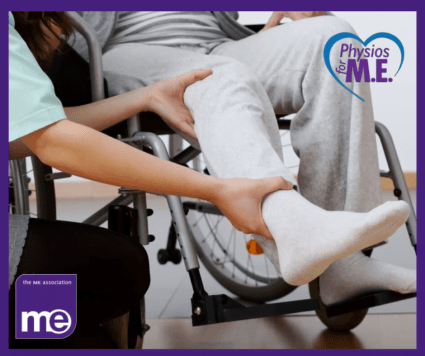By Karen Leslie, Natalie Hilliard, Michelle Bull, and Nicola Clague-Baker.
We are a group of physiotherapists from across the UK with a special interest in M.E.
In July we set a poll on the ME Association website asking about your experiences with physiotherapy.
We wanted to understand the perception of our profession and examine the effectiveness of treatment for people with M.E.
Thank you to everyone who completed the survey and to those who took the time to contact us directly with your stories.
Experience of physiotherapy
A total of 441 people answered the poll, and of those 232 (53%) had experienced physiotherapy.
Of those who had physiotherapy, 36% found it to be a positive experience, but over half (54%) had a negative experience.
The positive stories described physiotherapists who would work in partnership with their patients, open to learning about the disease and taking the time to listen and adapt treatment depending on how the symptoms were responding.
The negative stories highlighted a lack of professionalism that was really shocking and disappointing to read.
Effectiveness of physiotherapy treatment
In terms of the effectiveness of physiotherapy, only 11% of respondents reported that their symptoms improved, whereas a worrying 53% reported that physiotherapy made their M.E. symptoms worse.
Even within those who reported a positive experience of physiotherapy, 70% said it still didn’t make their M.E. better.
From the personal stories we received via email, Twitter and Facebook, we were able to build a sense of the kinds of treatment people with M.E. were receiving.

Various forms of exercise were described, as well as manual treatments like joint mobilisations and massage.
Some people received physiotherapy as a direct intervention to their M.E. symptoms, whereas others encountered physiotherapists for secondary problems such as joint pain.
What struck us most was there was no single treatment highlighted as either detrimental or effective. For example, some people responded very well to massage and found it gave them pain relief, but others reacted poorly and experienced more pain.
While any mention of graded exercise was included in a negative account, some people reported benefits from various low-level activities like core stability work.
This really showed how every person with M.E. is unique and that any treatment plan must be specific to the individual, not a standardised approach.
One of our favourite anecdotes was someone whose entire encounter with a physiotherapist involved them changing the configuration of their pillows. Although fleeting, this one act allowed the person to sleep more comfortably, which had a really positive impact on their quality of life.

It is these small but effective management strategies that we feel physiotherapists can excel at, and we should be exploring more for this patient group.
Overall the results suggest the general relationship between physiotherapists and people with M.E. is poor but indicates there is potential to improve.
Physiotherapy may not be a “treatment” for this disease, but therapists could use their skills to provide management solutions that can have a benefit to quality of life.
Next Steps
This data will help to provide background to our group’s work as we start the task of engaging with physiotherapists with the aim to raise awareness of the issues around physiotherapy treatment for people with M.E.
We have really appreciated the input from the M.E. community so far and the warm welcome we have received. You have even helped us to choose and design our logo through Twitter and Facebook polls!
We cannot provide medical advice as we are a virtual group, but we can signpost to useful resources for you or your therapist. Or you are welcome to share your experiences of physiotherapy for ME.
Please feel free to contact us at: physiotherapyforme@gmail.com
Thank you.
Image credits: 123RF/TylerOlsen/ KatarzynaBiałasiewicz
The ME Association
Real People. Real Disease. Real M.E.
We are a national charity working hard to make the UK a better place for people whose lives have been devastated by an often-misunderstood neurological disease.
If you would like to support our efforts and help ensure we can inform, support, advocate and invest in biomedical research, then please donate today.
Just click the image opposite and visit our JustGiving page for one-off donations, to establish a regular payment or to create your own fundraising event.
Or why not join the ME Association as a member and be part of our growing community? For a monthly (or annual) subscription you will also receive our exclusive ME Essential magazine.
ME Association Registered Charity Number 801279


